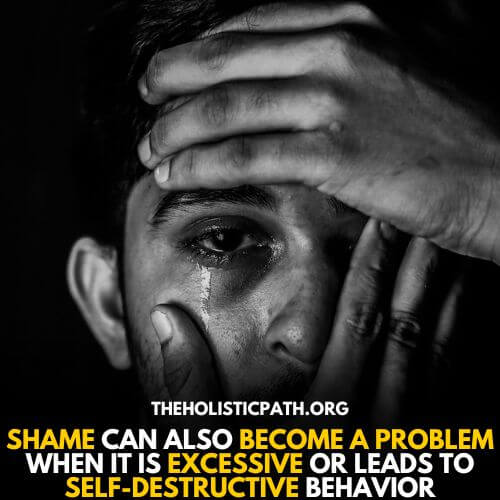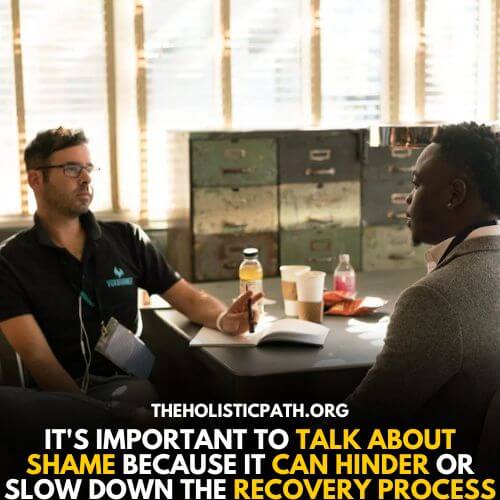Shame is an emotion that we all experience at some point in our lives. It is the feeling of being unworthy, flawed, or inadequate.
Shame can be incredibly debilitating, leading to feelings of isolation and despair.
Shame is often compounded by the fact that we are afraid to talk about it. We may feel like we are the only ones who feel this way, or that we should be able to overcome shame on our own.
Despite the fact that shame is a universal experience, it is still taboo in our society. We are not supposed to talk about shame, and we are certainly not supposed to feel it. This shame avoidance can be even more pronounced when it comes to therapy.
There is a stigma surrounding therapy, and many people believe that only weak or crazy people need it. This belief can make it difficult for people to seek help, even when they are struggling with shame. Continue reading to be able to navigate through the shame in therapy.
Shame And What Does It Feel Like
Shame is an unpleasant self-conscious emotion typically associated with a negative evaluation of the self. Shame is often accompanied by feelings of sadness, anxiety, and humiliation. People who experience shame tend to feel bad about themselves and are often very critical of themselves.
Shame is different from guilt, which is an emotion that arises when we believe we have done something wrong. Shame is often related to feelings of worthlessness and shamefulness.
Shame feels like:
- Feeling bad about yourself
- Being very critical of yourself
- Feeling worthless and shamefulness
When Does Shame Become A Problem
Shame is a normal and healthy emotion that we all feel at times. It can help us to learn from our mistakes and make better choices in the future. However, shame can become a problem when it starts to take over our lives.
We may start to believe that we are innately bad or unworthy, and this can lead to depression, anxiety, and other mental health problems. Shame can also cause us to withdraw from others and become isolated. Shame can also become a problem when it is excessive or leads to self-destructive behavior.

Here are some signs that shame may be becoming a problem:
- You avoid social contact or activities because you fear being judged or rejected.
- You ruminate on your mistakes and feel like you will never be good enough.
- You have difficulty accepting compliments or positive feedback.
- You are overly critical of yourself and others.
Our Social Context Makes Shame Worse
Shame is a funny thing. Everyone experiences it in some capacity, but it’s one of those things that we don’t talk about much. It’s seen as taboo, as something that should be hidden away. And yet, shame is a very real and very human emotion.
It’s normal to feel shame about certain things in our lives – shame is often linked to our sense of self-worth. However, when shame is left unchecked, it can lead to some serious consequences. For example, shame can make us withdraw from social situations, which can then lead to loneliness and isolation.
Shame comes from a wide range of areas in our lives. We may feel shame about our achievements, or lack thereof. We may feel shame about our bodies, our sexuality, or our gender.
We may feel shame about our cultures or our background. And, lastly, we may feel shame because of the trauma of abuse.
Living in a highly judgmental society doesn’t help either.
We are constantly bombarded with messages telling us that we need to be thinner, prettier, wealthier, and more successful. It’s no wonder that so many of us end up feeling shame. On top of that, modern communication has made it easier for people to shame each other.
With the click of a button, anyone can anonymously shame someone else online. This can be incredibly hurtful and can make it even harder for someone to seek therapy or help.
Additionally, shame can make us more likely to turn to unhealthy coping mechanisms such as substance abuse. What’s more, shame can prevent us from seeking out the help of a therapist or counselor, which can be vital in managing our mental health.
So why do we shy away from talking about shame? It could be that we’re afraid of being judged. Or it could be that we don’t want to face up to our own shame.
Either way, it’s important to remember that shame is a normal emotion – and one that shouldn’t be taboo. If you’re struggling with shame, don’t be afraid to seek out professional help.
Shame In Therapy Can Be Induced By Trauma
Shame in therapy can be induced by trauma. Shame is often associated with feelings of humiliation, embarrassment, and worthlessness. Shame can also be a defense mechanism that protects us from painful experiences.
Shame can be induced by trauma, such as childhood abuse or neglect, sexual assault, domestic violence, and even just watching someone else experience trauma or other traumas. Shame can also be induced by our own thoughts and beliefs about ourselves. Shame is often a barrier to healing from trauma.
Shame can prevent us from seeking help or opening up to others about our experiences. Shame can also make us feel isolated and alone.
Shame is a normal reaction to trauma, but it is not a healthy or helpful emotion. Shame is a very painful emotion that can prevent people from seeking out therapy or getting the help they need.
Can Shame Hinder The Recovery Process?
Shame is definitely something that can come up in therapy. It can be shame around the reason why you’re in therapy in the first place, shame around admitting certain things about yourself, shame around not making progress fast enough… Really, shame can come up about anything.
And it’s important to talk about shame because it can definitely hinder or slow down the recovery process. It’s important to be open and honest in therapy, but shame can make people feel like they need to keep secrets or hold back information.

This can prevent them from making progress in therapy. Shame can also make people feel like they’re not worth the time and effort of therapy, which can lead them to give up on treatment altogether. Shame creates feelings of isolation, which can make people want to withdraw and avoid talking about the things that are hardest to face.
But shame also often masquerades as anger or embarrassment, making it hard to identify.
If you’re in therapy and you’re feeling stuck, ask your therapist if shame might be a factor. It’s nothing to be ashamed of, but it is something that can get in the way of healing.
Shame In Therapy Sessions
Shame in therapy is often an important topic to discuss. Shame may present itself in therapy sessions in a number of ways. In therapy sessions, shame may arise in response to discussing personal struggles or failures.
For example, shame may come up when discussing difficult topics such as abuse, trauma, or neglect. Shame may also arise during conversations about mental health, addiction, or other sensitive topics.
Shame may also be triggered by the therapeutic process itself, such as when exploring deep-seated emotions or addressing painful memories.
Shame can be a helpful emotion that motivates us to change negative behaviors or learn from our mistakes. However, shame can also lead to negative self-talk, isolation, and depression.
If shame is preventing you from living your best life, therapy can be a safe space to explore these feelings and develop coping mechanisms. Here are some things you may discuss in therapy sessions about shame:
- The origins of your shame: When did you first start feeling shame? What events or experiences may have contributed to these feelings?
- The role of shame in your life: How does shame impact your thoughts, emotions, and behavior? Do you tend to isolate yourself when you’re feeling shame? Do you engage in negative self-talk? Shame can also be a motivator – what are some positive changes you’ve made as a result of feeling shame?
- Your relationship with shame: What are your thoughts and feelings about shame? Do you believe that shame is helpful or harmful? How do you want to change your relationship with shame?
- Coping with shame: What are some healthy ways to deal with shame? How can you reframe negative thoughts associated with shame? What activities make you feel better when you’re experiencing shame? Who in your life can provide support during these times?
Shame can be a difficult and painful emotion to deal with, but it is often an important part of the healing process. By working through shame in therapy, individuals can begin to address the underlying issues that contribute to it and start to move forward in their lives.
Trying to cope with shame on your own can be difficult and overwhelming. If you’re struggling to manage feelings of shame, consider talking to a therapist.
Therapy can provide an opportunity to explore the origins and impacts of shame in your life. You and your therapist can work together to develop healthy coping mechanisms so that you can live your best life.
The Many Masks You Hide Behind Because Of Shame
Shame is such a loaded word. It seems like shame is always accompanied by a sense of inadequacy or being unworthy. And often, shame can be paralyzing. We can be so afraid of judgment or rejection that we start to build walls around ourselves, wearing masks to protect our vulnerable shame-based selves.

- Anger: We may hide our anger behind a mask of narcissism or perfectionism. We may feel that we need to be perfect in order to prove our worth, or that we need to be narcissistic in order to protect our fragile egos.
- Narcissism: We may hide our vulnerability and feelings of shame behind a mask of self-absorption and grandiosity. We may feel that we need to put on a show and be the life of the party in order to cover up our innermost fears and insecurities.
- Perfectionism: We may hide our feelings of inadequacy and insecurity behind a mask of perfectionism. We may feel that we need to be perfect in order to be accepted by others and to feel good about ourselves.
- Carer: We may hide our feelings of shame and vulnerability behind a mask of care and concern for others. We may feel that we need to take care of others in order to make up for our own sense of deficiency and insecurity.
- Independence: We may hide our feelings of shame and vulnerability behind a mask of independence and self-reliance. We may feel that we need to appear strong and self-sufficient in order to avoid being seen as weak or vulnerable.
- Indifference: We may hide our feelings of shame and vulnerability behind a mask of indifference and detachment. We may feel that we need to appear cool, calm, and collected in order to avoid being seen as emotional or needy
These masks can help us to feel better about ourselves, but they also prevent us from being our true selves. When we are hiding behind a mask, we are not able to fully connect with others or experience the depth of intimacy that comes from being vulnerable.
Masks can also be exhausting to keep up with and can eventually lead to more shame if we believe we are not living up to the standards we have set for ourselves. So why do we wear them? Because shame is a powerful emotion that can lead to feelings of isolation and disconnection.
If we can’t find a way to move through our shame, it will continue to control us and prevent us from living our best lives.
Tips For Sharing Your Shame In Therapy
Shame is a powerful emotion that can prevent us from seeking help when we need it most. If you’re struggling with shame, know that you’re not alone. Here are 10 tips for sharing shame in therapy:
- Find a therapist you trust: This is crucial. If you don’t feel safe and comfortable with your therapist, it will be much harder to share shame-based experiences and feelings.
- Start small: You don’t have to (and shouldn’t) share everything all at once. Start with something small and work your way up.
- Connect with other people who get it: There are likely others out there who understand what you’re going through. Seek out support groups or online communities where you can connect with others who ‘get it.’
- Challenge shame-based thoughts: When shame-based thoughts come up, challenge them. For example, if you’re thinking ‘I’m such a bad person,’ ask yourself ‘why?’ and ‘is that really true?’
- Normalize difficult emotions: It’s important to remember that all emotions are valid and normal, even unpleasant ones. Shame is often accompanied by other difficult emotions like sadness, anger, and fear.
- Be gentle with yourself: Beating yourself up will only make things worse. Practice self-compassion and extend yourself the same grace and understanding you would give to others.
- Talk about shame outside of therapy: In addition to talking about shame in therapy, try to bring it up in other settings as well. This can help normalize shame and make it feel less taboo.
- Seek professional help if needed: Sometimes, shame can be too much to handle on our own. If this is the case for you, seek professional help from a therapist or counselor.
- Remember, shame is not who you are: Shame is an emotion, not an identity. Remind yourself that shame does not define you or determine your worth as a person.
10 Ways For Overcoming Shame In Therapy
Shame is a common issue that can come up in therapy. It can be shame around the things we’ve done, shame around who we are, shame around our bodies, or shame around our past.
Shame can be debilitating and make it hard to show up in our lives. Here are 10-15 ways for overcoming shame in therapy:
1. Acknowledge And Accept Shame
Shame is often seen as a negative emotion that we should try to avoid. However, if we deny or bury our shame, it can become even more powerful and destructive.

It is important to first acknowledge and accept that shame exists within us. This means being honest with ourselves about our feelings of shame, and not trying to hide or ignore them.
2. Get Curious:
When someone experiences shame, it’s often difficult to understand why it’s happening and what might be causing it.
It’s natural to want to find out the root cause of shame in order to address it and hopefully begin to feel better.
Shame can be caused by a variety of things, such as past experiences, family dynamics, or current situations. By getting curious and exploring what might be at the root of your shame, you can start to understand it better and work on addressing it.
Why do you feel shame around certain things? What’s at the root of it? Explore it with curiosity instead of judgment and see what you find out about yourself. The more you understand about shame, the less power it will have over you.
3. Identify Shame-Triggering Situations:
Shame often emerges in response to certain situations or experiences that we find particularly difficult or embarrassing. Identifying these situations can help us to be prepared for the feelings of shame that may arise and to have strategies for managing them.
4. Challenge Shaming Thoughts And Beliefs:
One of the key ways to manage shame is to challenge the thoughts and beliefs that fuel it. Shaming thoughts such as “I’m not good enough” or “I’m a failure” can make us feel even more ashamed and unworthy.
When we are able to question these thoughts, it can help us to break the cycle of self-judgment and negativity.
5. Practice Self-Compassion:
Shame can be very isolating and destructive, leading us to feel bad about ourselves and unworthy of love and support. However, we can counter these feelings by practicing self-compassion.
This involves being kind and understanding towards ourselves, even when we make mistakes or experience setbacks. Self-compassion allows us to connect with our inner sense of worthiness, which can help us to manage feelings of shame more effectively.
6. Connect With Others In Supportive Relationships:
Shame is often experienced as a deeply personal emotion, but it is actually a very common human experience. When we share our experiences of shame with others who understand what we are going through, it can help us to feel less alone and more supported.
In supportive relationships, we can give and receive empathy, understanding, and compassion – which can be invaluable in managing feelings of shame.
7. Express Emotions Openly And Honestly:
Shame thrives on secrecy and isolation, so one of the best ways to counter its effects is by openly sharing our emotions with others. This includes both positive emotions such as joy, happiness, and love, as well as negative emotions such as sadness, anger, and fear.
When we express our emotions honestly and openly, it helps us to connect with others on a deeper level and ultimately reduces the power of shame in our lives.
8. Avoid Self-Judgment And Perfectionism:
Shame often leads to self-judgment and perfectionism, two attitudes that only serve to compound the problem. When you judge yourself harshly, it only makes you feel worse about yourself, which leads to more shame.

And when you strive for perfection, you set yourself up for failure, which only leads to more disappointment and humiliation.
Learning how to accept yourself just the way you are is an important step in overcoming perfectionism.
9. Take Care Of Yourself Physically And Emotionally:
It is crucial that you take care of yourself physically and emotionally when dealing with shame. This means getting enough sleep, eating healthy foods, and exercising regularly.
It also means taking time for yourself every day to do things that make you happy. Indulging in activities that bring joy can help combat the negative emotions associated with shame.
10. Take Baby Steps:
Change doesn’t happen overnight. When you’re working on overcoming shame, take baby steps and celebrate each small victory along the way.
Takeaway
Shame is a powerful and destructive emotion that can prevent people from seeking the help they need. Shame often keeps people trapped in a cycle of self-blame and self-hatred, which can be difficult to break free from.
However, shame can be addressed in therapy, and there are many therapists who specialize in helping people to deal with shame. Shame is a complex emotion, but with the help of a therapist, it is possible to learn how to manage shame and live a happier, healthier life.
References
Burgo, J., PhD, deVries, D., & Audio, B. (2018). Shame: Free Yourself, Find Joy, and Build True Self-Esteem. Brilliance Audio.
Mark R. Zaslav. (1998). Shame-related states of mind in psychotherapy. The Journal of Psychotherapy Practice and Research, 7(2), 154–166. https://pubmed.ncbi.nlm.nih.gov/9527959/
